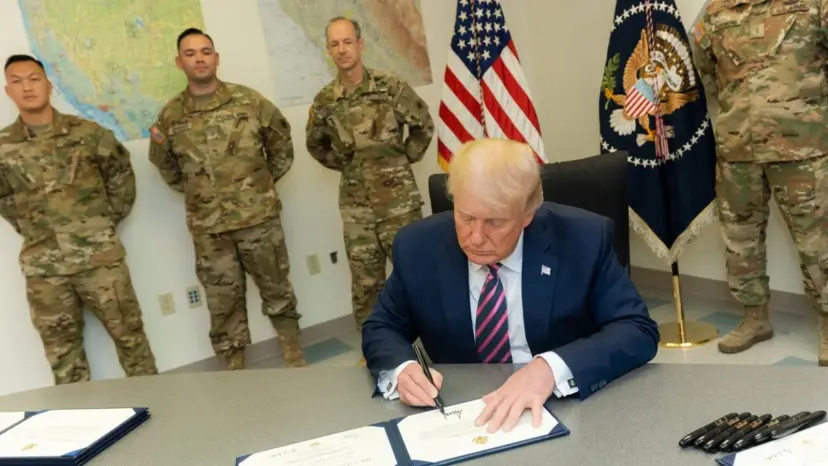By Headlinenews.news Investigations Desk
November 6, 2025
The National Patriots Movement and Headlinenews.news can confirm that viral claims alleging the U.S. military has submitted “attack plans” on Nigeria are false and misleading.
Our investigation found no official record or confirmation from the U.S. Department of Defense, the White House, or Secretary of War Pete Hegseth’s verified channels to support this rumor.

Contingency Planning Is Not an Attack Plan
Recent online confusion began after President Trump instructed the U.S. Department of Defense to “prepare for possible action” in response to continued violence and corruption in Nigeria’s counterterrorism efforts.
This phrase has been deliberately misrepresented by some social media accounts as evidence of an imminent invasion.
“Contingency planning is preparation, not provocation.”
— The National Patriots Movement.
In military operations, a contingency plan is a precautionary draft—a what-if scenario, not a command to strike.
Every major power conducts such planning routinely to ensure readiness, but it does not mean war is authorized or expected.
International Law and Sovereignty Still Apply
No nation, including the United States, can lawfully invade another country at will.
Any form of military engagement would require formal authorization, congressional oversight, and likely United Nations consultation.
So far, none of these steps have occurred.
Nigeria’s sovereignty remains protected under international law, and both U.S. and Nigerian officials have reaffirmed the importance of respecting it.

The Real Issue: Misuse of U.S. Military Aid
While there is no attack plan, Washington’s frustration with Nigeria runs deep.
Over two decades, the U.S. has supplied Nigeria with billions of dollars in weapons, training, and counterterrorism funding—yet insurgency persists.
Investigations have exposed cases of Nigerian soldiers selling weapons to terrorists and diverting aid.
These revelations have angered U.S. leaders, who now demand transparency, accountability, and measurable progress before continuing large-scale support.
The Human Cost: Nigerians Continue to Suffer
Whether Christian or Muslim, countless Nigerians have fallen victim to terrorism.
Entire communities have been wiped out in Borno, Kaduna, Zamfara, Katsina, and Plateau States.
Churches and mosques alike have been burned. This tragedy is not one-sided genocide, but the symptom of a wider national security collapse.
“Both Christians and Muslims are dying. The issue is not religion—it’s accountability.”
The National Patriots Movement Advisory : Ignore False Social Media Claims
Headlinenews.news advises Nigerians, the diaspora, and global audiences to disregard unverified posts claiming the U.S. is preparing to attack Nigeria.
These stories are false, exaggerated, and crafted to incite fear or political tension.
The U.S. has expressed anger over corruption and unaccounted military aid, not intent to invade.
Nigeria must seize this moment to reform its defense system, rebuild credibility, and prove that the war against terror can still be won.

What Is a Contingency Plan?
Term Meaning Common Misuse
Contingency Plan A pre-drafted military or diplomatic response to a possible future crisis. It is not an order to act. Misreported as “attack plan” or “strike authorization.”
Operational Plan A detailed, approved strategy to execute a mission. Requires presidential or congressional approval. Often confused with contingency planning.
Every responsible military prepares for scenarios. Preparation is not aggression.
Princess Gloria Adebajo-Fraser MFR.
Final Word
There is no approved attack plan on Nigeria.
What exists is diplomatic frustration over corruption and unfulfilled commitments.
The United States wants results, not rhetoric—and Nigeria now has the opportunity to show accountability, professionalism, and leadership in defeating terrorism.
The National Patriots.
Headlinenews.news Special Investigative Report.
AS REPORTED BY SOCIAL MEDIA
The United States military has reportedly drawn up a range of attack plans targeting Nigeria, following President Donald Trump’s directive to prepare for potential action over what experts and officials have largely dismissed as false claims of a “Christian genocide.”
According to a report on Wednesday, the U.S. Africa Command (AFRICOM) submitted several contingency options to the Department of War at the request of Secretary Pete Hegseth. The proposed plans reportedly outline three levels of military response — heavy, medium, and light — allowing for different degrees of escalation depending on how the situation unfolds.

Three Tiers of Possible Action
Military officials cited by the New York Times said the “heavy option” represents the most forceful military approach under consideration. It would involve deploying an aircraft carrier group to the Gulf of Guinea, launching fighter jets or long-range bombers for deep strikes inside northern Nigeria.
The “medium option” focuses on drone warfare, using Predator and Reaper drones to strike militant camps, convoys, and vehicles. These drones can loiter over targets for hours while intelligence teams track “patterns of life” to enable precision strikes.
The “light option”, meanwhile, centers on partner-assisted operations, where U.S. forces and the State Department would support Nigeria’s military in targeting Boko Haram, ISWAP, and other extremist factions responsible for attacks, kidnappings, and killings across the north.
Strategic Objective and Sovereignty Concerns
According to the report, the main objective of these plans is to neutralize Islamist militants, protect Christian communities, and stabilize northern Nigeria.
However, several U.S. and African security analysts have warned that any unilateral military intervention could undermine Nigeria’s sovereignty, trigger civilian casualties, and strain diplomatic relations between Washington and Abuja.
The report also noted that the Department of War is currently reviewing AFRICOM’s submissions, though some officials have voiced concern over the potential consequences of implementing any of the proposals.

Analysts told the Times that one of the biggest challenges lies in the complex and multi-dimensional nature of Nigeria’s conflicts. Violence in the Sahel and Middle Belt is often driven by disputes over land, resources, and ethnicity, rather than religion alone.
This makes it difficult to frame the unrest purely in terms of Christian persecution or jihadist ideology, as claimed by President Trump and some U.S. politicians.
Operational and Logistical Challenges
Retired U.S. Army Major General Paul Eaton, a veteran of the Iraq War, told the Times that any heavy-handed military action in Nigeria could be disastrous.
“It would be a fiasco,” he warned. “These actions would cause shock and confusion rather than quell the conflict — it’s like pounding a pillow.”
Eaton added that the heavy option, which involves long-range bombers, would require deploying carrier groups to the Gulf of Guinea — a move complicated by limited carrier availability.
Currently, the USS Gerald R. Ford, America’s most advanced aircraft carrier, is being redirected from Europe to the Caribbean for an anti-narcotics campaign, while other carriers remain committed to the Pacific and Middle East.
Drone Limitations in West Africa
Even the drone-based medium option faces serious constraints. The U.S. military withdrew from its two key drone bases in Niger — Agadez and Niamey — in August, sharply reducing its operational reach in the region.
This withdrawal leaves the U.S. with no immediate launch platforms for sustained air operations over Nigeria or the Sahel.
The reported plans come shortly after President Trump accused Nigeria of committing “a Christian genocide,” a claim rejected by the Nigerian government and disputed by multiple independent investigations, including those by the BBC and human rights organizations.
Officials in Abuja have emphasized that terrorist violence in Nigeria affects both Christians and Muslims, calling Trump’s assertions a “misrepresentation of the security crisis.”
As the Pentagon and the Department of War deliberate on AFRICOM’s proposals, diplomatic observers warn that any U.S. strike on Nigerian soil could inflame regional instability and set a dangerous precedent for U.S.-Africa relations.
For now, Washington appears divided — between those urging restraint and those pushing for a show of force under the banner of protecting religious freedom.




